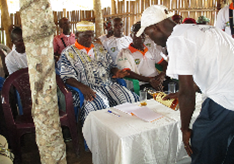
Nov. 2014—In western Côte d'Ivoire, disputes over land ownership frequently lead to violence. Informal land lease or sale arrangements, especially when involving individuals not considered indigenous to the community, generate feelings of resentment and exploitation that sometimes boil over into open conflict. But two villages recently chose a different path to resolve their disputes.
“More than 80 percent of my time is spent solving land disputes in my district,” said Soumaïla Koné, a local senior government official in Bangolo.
Historically, migrant workers as well as those from outside the country form the majority of farmers working some of the most fertile land. The simmering tensions over land ownership in the region have driven a wedge between indigenous and migrant communities.
In September 2014, USAID’s Office of Transition Initiatives provided a grant to support peaceful land dispute resolution among two conflicting communities in the Bangolo villages of Dah and Béoué. The Sub-Prefecture of Bangolo met with community members separately to identify their issues clearly and open the way to dialogue with their neighbors. Initial meetings were followed by a three-day training workshop on land conflict management for various community leaders and local stakeholders in the land sector. Subsequently, intercommunity meetings were held to test new methods of land conflict resolution.
Community-level meetings began in late September 2014 in Béoué. Eighty-four people, including a dozen women, participated in this first meeting to discuss the land dispute taking place with Dah. A conflict mediation specialist asked participants—who included residents from both villages as well as people from nearby villages who served as witnesses—to reflect on whether conflict, legal action or consensus was their preferred method of resolving their issues.
The following day, the meeting moved to Dah, where 146 people participated, including 39 women. This time, the session was opened with an offering of liquor by the Dah chief to the visitors from Béoué—symbolizing the desire to resolve disputes through consensus rather than violence. Sharing liquor in the local culture represents bonding and is a pledge of forgiveness and reconciliation.
Koné believes this activity has facilitated significant change: “There was never a day I wouldn’t have villagers from Dah and Béoué in my office with complaints over land demarcations.” Since the meetings, he says, “we haven’t recorded a single threat or complaint.”
LINKS







Comment
Make a general inquiry or suggest an improvement.